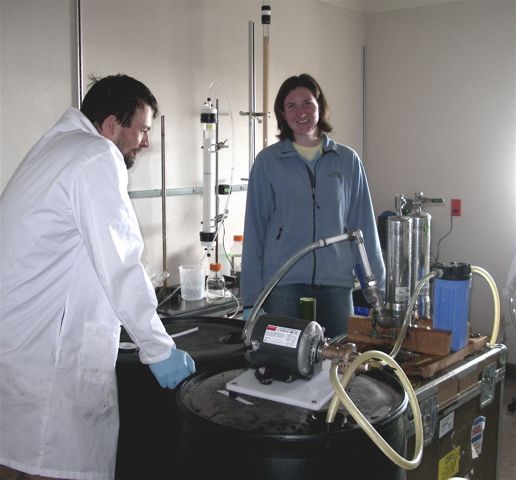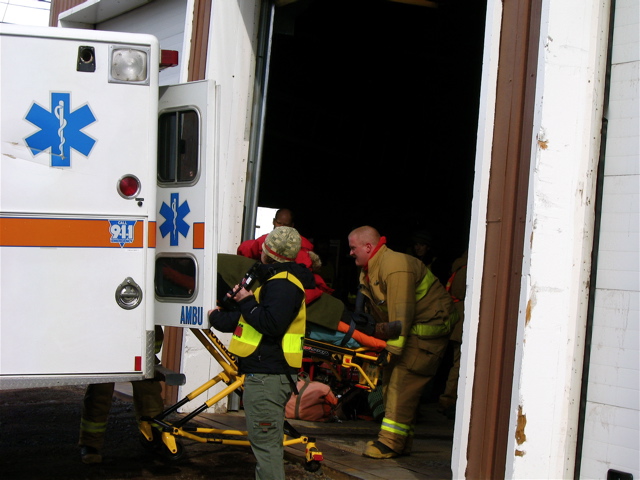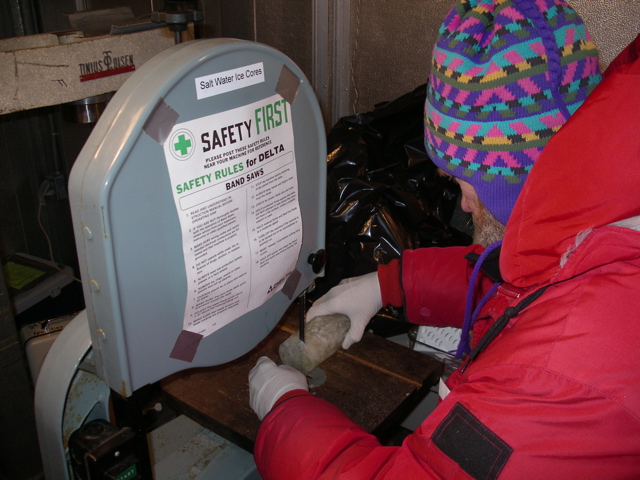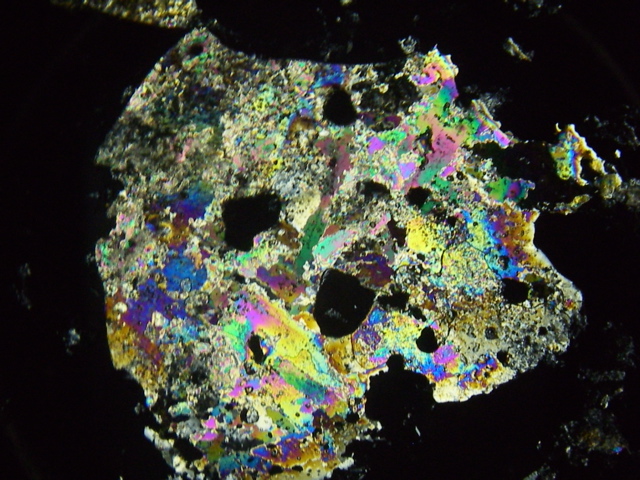( Log In ) Log In is for TREC Teachers & Researchers only
  |
| Dena_Rosenberger |
 Dec 7 2005, 05:13 AM Dec 7 2005, 05:13 AM
Post
#1
|
 TREC Teacher    Group: TREC Team Posts: 96 Joined: 1-November 05 Member No.: 22 |
The Rock of Antarctica
7 December, 2005 For those interested in things Antarctic, check out the weekly Antarctic newspaper at http://AntarcticSun.usap.gov Hello from the Ice! For additional Antarctic pics, check out the Gallery. Where’s Rosenberger? McMurdo Station, Ross Island, Antarctica My first full CONDITION 2! I was scheduled to go on a recreational trip after dinner but it has been cancelled due to weather. CONDITION 2 is defined by one or more of the following: wind speeds of 48-55 knots, wind chill of -75 to -100 F, or visibility less than one-quarter mile. The trip was to be out to the site of a cargo plane crash. In 1970, the Pegasus lost control upon landing due to high crosswinds on the ice runway. All 80 people survived and they have left the plane there with the tail sticking out of a snowbank. For some reason, it is a popular destination spot. Hey, we’re in Antarctica.  Of course, no photolysis experiments on the roof today – they would just blow away. Chris and Kaelin spent the day filtering Pony Lake water into 55-gallon drums using a high flow rate system called a Balston Filtration System for large volumes of stuff.  Safety is extremely important here at McMurdo and today there was a Mass Casualty Drill. I was not needed in the lab this morning, so I went to watch the action. They were very well organized with fire trucks zipping around and people that had volunteered to be “victims” being brought in on stretchers. Others had been trained in Emergency Medical and Triage.  Ed Adams is a professor of engineering at Montana State University and he is an ice expert. Today he took the ice cores that we have been keeping in the deep freeze and cut them into thin sections. This also had to be done inside the -10 C freezer!  He told me that ice is the “rock” of Antarctica and the focus of quite a bit of study. Ice actually forms large hexagonal crystals (think of the shape of a snowflake, but 3-D) and the scientists can tell a lot about the temperature and pressure conditions when the crystal formed by examining the orientations of the ice crystals with each other. By passing light through the very thinly cut ice core cross-sections and examining the polarization and diffraction patterns, they can see how the crystals are related to each other. Algae and other microbes can actually live in the spaces between these crystals and this is why our group is interested in these beautiful patterns.  Did you know? The Ross Ice Shelf is named after Scotsman James Clark Ross, who sailed along the ice shelf for 450 kilometers in 1839. He sailed his two ships, the Erebus and the Terror, along the 60 meter high shelf in his quest to find the South Magnetic Pole. It was, Ross wrote, “a mighty and wonderful object far beyond anything we could have thought or conceived. What was beyond it we could not imagine.” Current Conditions at McMurdo Station CONDITION 2! Yippee! Right now: Overcast with blowing snow Winds out of the south at 35-45 knots, low visibility due to blowing snow Pressure: 29.350 inHg Temperature: 30 oF/ -1 oC with wind chill: -4 F/ -20 C (sure feels colder!) Sunset: February 20 at 1:38 am |
| Sloth |
 Dec 7 2005, 07:47 AM Dec 7 2005, 07:47 AM
Post
#2
|
|
Unregistered |
Wow, chilly. And we all thought it was going to be a stroll in the park. I guess that's it for your wall.
|
| Amanda |
 Dec 7 2005, 09:17 PM Dec 7 2005, 09:17 PM
Post
#3
|
|
Unregistered |
wow those are really pretty, How do the different colors form in the rock? What makes the different colors in the rock are they chemicals or just different reactions in the rock?
|
| Dena_Rosenberger |
 Dec 7 2005, 10:58 PM Dec 7 2005, 10:58 PM
Post
#4
|
 TREC Teacher    Group: TREC Team Posts: 96 Joined: 1-November 05 Member No.: 22 |
Hi Amanda:
The different colors are the result of diffraction, which is the light being bent differently as it passes through different densities and orientations of ice. Think of a rainbow, which is the light being bent through drops of water. It is beautiful, isn't it? Ms. R QUOTE(Amanda @ Dec 7 2005, 09:17 PM) |
| Guest |
 Dec 8 2005, 12:14 AM Dec 8 2005, 12:14 AM
Post
#5
|
|
Unregistered |
QUOTE(Dena_Rosenberger @ Dec 7 2005, 10:58 PM) Hi Amanda: The different colors are the result of diffraction, which is the light being bent differently as it passes through different densities and orientations of ice. Think of a rainbow, which is the light being bent through drops of water. It is beautiful, isn't it? Ms. R Can you bring some back or will they restict you from doing it cause it taking? |
  |
1 User(s) are reading this topic (1 Guests and 0 Anonymous Users)
0 Members:

|
NSF Acknowledgment & Disclaimer | Time is now: 5th November 2024 - 11:34 AM |
Invision Power Board
v2.1.7 © 2024 IPS, Inc.









